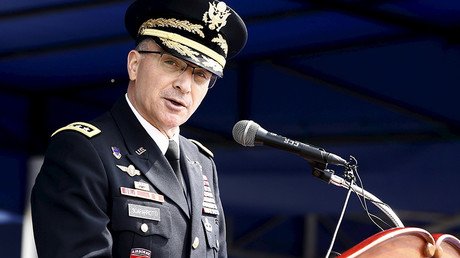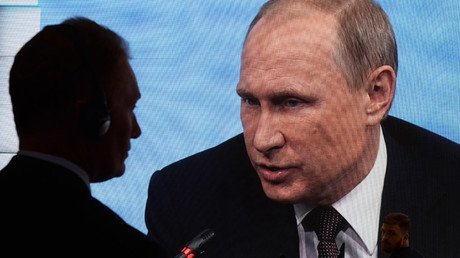World order in 2035: US could lose ability for global dominance, DoD paper says

By 2035, the US could find itself in an environment where Russia or China may match or even exceed the West’s military and economic might in some areas, taking advantage of a “disordered and contested world,” the Pentagon’s research unit said.
In just 20 years, the US and its allies will live in a world where shaping a global order the way they have since the end of the Cold War would be increasingly difficult, if not impossible, Pentagon’s research division, the Defense Technical Information Center (DTIC), warned in a new foresight report.
“The future world order will see a number of states with the political will, economic capacity, and military capabilities to compel change at the expense of others,” reads the paper entitled “The Joint Force in a Contested and Disordered World.”
“Rising powers including for example, China, Russia, India, Iran, or Brazil have increasingly expressed dissatisfaction with their roles, access, and authorities within the current international system,” it states.
“Russia will modernize its land, air, and sea-based intercontinental nuclear forces” and make use of deterrent operations such as “snap nuclear exercises, bomber flights, and strategic reconnaissance overflights into US territory,” the Pentagon’s researchers predict.
The report admits Russia and China are among countries dissatisfied “with the current Western-derived notion of international order.”
Russia, China, India, and others, labeled “revisionist states” in the report, would promote alternate international alliances, while the West’s shrinking resources would also have an impact on Washington’s dominance across the globe.
“Although seemingly insignificant today, organizations such as the Shanghai Cooperation Organization and the Eurasian Economic Union could grow as China, Russia, India, and others turn to these multinational groups to reorder international rules in their favor.”
“Demographic and fiscal pressures will continue to challenge NATO’s capacity and capability,” the paper warns. “In Asia, perceptions of reduced US commitment may encourage current allies and partners to pursue unilateral military modernization efforts or explore alternative alliances and partnerships.”
However, though the Pentagon’s report states that “no power or coalition of powers has yet emerged to openly oppose US global influence and reach,” it claims “the United States will operate in a world in which its overall economic and military power, and that of its allies and partners, may not grow as quickly as potential competitors.”
A number of states “can generate military advantages locally in ways that match or even exceed that of the Joint Force and its partners,” while American technological superiority “will be met by asymmetric, unconventional, and hybrid responses from adversaries.”
Offering a vision of the world in 2035, the paper says in conclusion it is unclear if the US “can be simultaneously proficient at addressing contested norms and persistent disorder with currently projected capabilities, operational approaches, and fiscal resources.”
“There may be times when it is more appropriate to manage global security problems as opposed to undertaking expensive efforts to comprehensively solve them.”
Moscow has repeatedly denied allegations of it harboring global ambitions as opposed to that of the US.
Russia “is not aspiring for hegemony or any ephemeral status of a superpower,” President Vladimir Putin said at the St. Petersburg International Economic Forum last year, adding: “We do not act aggressively. We have started to defend our interests more persistently and consistently."
Earlier this year, Russia adopted a new edition of its foreign policy doctrine, which mentions a shift towards a multipolar and a “polycentric” world.
“A transition to polycentric architecture should be ideally based on the interaction of leading centers of power,” Russian Foreign Minister Sergey Lavrov said in April. He added however, that he was not sure if that was achievable.














